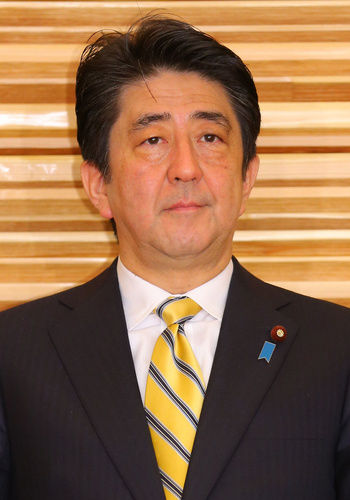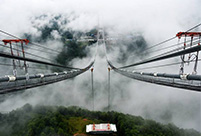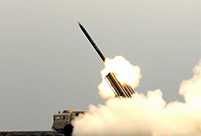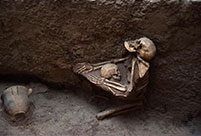

 |
BEIJING, Aug. 14 -- As Japanese Prime Minister Shinzo Abe releases an official statement later Friday to mark the 70th anniversary of his country's surrender at the end of World War II (WWII), he is standing at a critical crossroad.
Upon such a highly symbolic and closely watched occasion, Abe has a choice to make, and there is only one way that will lead him and his nation closer to the "normal country" dream he has so frequently shouted from the rooftops.
Choosing a wrong course -- or keeping going astray, given his record on the sensitive history issue -- will undoubtedly carry the second-term prime minister further away from a legacy in nation-building he so desperately needs, as his signature "Abenomics" is losing sizzle.
Any statement that flagrantly flouts the true history and fails to repent Japan's WWII atrocities would be tantamount to Abe dropping a bomb upon his country's international reputation and trustworthiness.
Such an "Abomb" would be particularly sad, as its sole victim would be Japan itself, Abe's motherland, which is the only country in the world that has been A-bombed and still in the healing.
It would also be extraordinarily irresponsible and destructive, not only because its shock waves would blow the chances for his "normal country" ambition to come true anytime soon, but because its fallout would further ail Japan's already morbid ties with its neighbors and stoke regional tensions.
If Abe possesses any reasonable level of sobriety, he will not throw an "Abomb" at his own country. Rather, judging from the trial balloons he has released of late, a more likely scenario is that the canny nationalist would offer an adulterated apology.
An "Abapology" -- mentioning such key words as aggression and apology but placing them in a context that waters down their meaning, or releasing nuanced versions in different languages -- would be regrettable.
Such a half-hearted apology would once again reveal Abe's deep reluctance to face up to his country's wartime crimes and take on the noble responsibility on his shoulders in seriously reflecting on the past in order to usher Japan into a world-assuring future.
A muddle-through approach of that kind would be not only unworthy of the great significance of the historic juncture, but indicative of a conspicuous lack of political and historical calcium, which explains to a large extent why Japan remains an "abnormal" country 70 years after WWII.
The only right way forward is for Abe to stop his rightist slide and provide a proper and unalloyed apology -- explicit enough to demonstrate heartfelt remorse and a resolve to abandon his erstwhile troublesome attitude toward WWII history and help dispel the specter of distrust between his country and its neighbors.
Yet should history be any guide, even an apparently whole-hearted apology from Abe would not be enough. It is the least he should do. To realize his "normal country" dream and restore Japan's standing on the world stage, he has to follow up with concrete actions.
 Striking moments when strategic missiles are launched
Striking moments when strategic missiles are launched Construction on Asia’s biggest suspension bridge started
Construction on Asia’s biggest suspension bridge started Impressive firing of China’s rocket artillery system
Impressive firing of China’s rocket artillery system Shocking scenes found in 4000-year-old earthquake relic
Shocking scenes found in 4000-year-old earthquake relic Female soldiers add color to military parades
Female soldiers add color to military parades Mums stage breastfeeding flash mob
Mums stage breastfeeding flash mob Awesome Chinese missiles
Awesome Chinese missiles Official shot having sex with two college girls
Official shot having sex with two college girls Moscow “spider-man” climbs Chinese skyscraper
Moscow “spider-man” climbs Chinese skyscraper Keeping cool in ancient China
Keeping cool in ancient China Tianjin explosion: Latest updates
Tianjin explosion: Latest updates Hyping threat of yuan devaluation absurd
Hyping threat of yuan devaluation absurd Warehouse explodes near Tianjin’s port, 44 killed, over 400 injured
Warehouse explodes near Tianjin’s port, 44 killed, over 400 injuredDay|Week